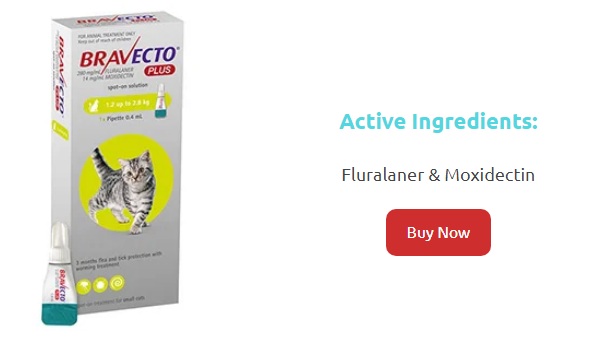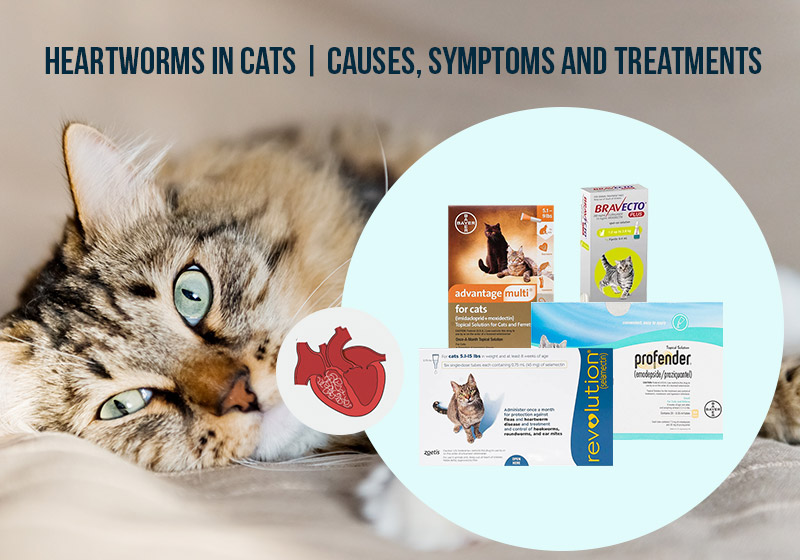Heartworm disease in cats varies greatly from that in dogs. The cat is an uncommon host for heartworms, and the majority of worms in cats do not reach adulthood.
This is why there are normally only one to three adult heartworms in cats. Hence, heartworm disease in cats often goes undiagnosed.
But it’s important to note that even amateur worms can cause serious problems in the respiratory system of cats.
How do cats get heartworms?
Heartworm infection in cats starts when a mosquito bites an animal that is already infected with the parasite. Microfilaria, which is the youngest larvae, is picked up by a mosquito and this microfilaria lives within it for 10 days to 2 weeks and develops into an infective larvae stage.
Once the parasite enters the cat’s tissue, it wiggles its way across the body and into the bloodstream.
It takes about six months to travel across the body, through the tissues, and into the bloodstream. It grows into an adult worm from there.
What distinguishes heartworm in dogs from heartworm in cats?
- Infected cats usually have fewer than six adult heartworms, compared to 25-50 in dogs with a mild heartworm infection.
- A few worms can cause havoc because the heart and blood vessels of cats are small. Six worms or less in a dog may not be considered worth treating. While a single worm in a cat may easily cause a fatal infection.
- An adult heartworm can live for five years in a dog and it only lives for two to three years in a cat, owing to the cat’s powerful immune response.
Symptoms of heartworms in cats
Intermittent vomiting, diarrhoea, trouble breathing, coughing, loss of appetite, lethargy, and weight loss are the most common clinical symptoms of heartworm infection in cats.
Treatments & Preventions
A minor change in your cat’s actions should be examined to ensure there is no underlying issue. If you suspect your cat has a heartworm infection, contact your veterinarian immediately. Treatments such as those mentioned below are often recommended by veterinarians:
Revolution for cats

How to use:
- Throughout the year, Revolution for cats should be applied once a month on the same date of the month.
- Use the entire contents of the tube. Splitting the contents eliminates the dose’s potency.
- Part your pet’s hair between the shoulder blades at the base of the neck, and then place the tube’s tip on the skin.
Advantage Multi (Advocate) for cats

How to use:
- Remove the cap of Advantage Multi(Advocate) for Cats from the tube while keeping it in an upright position.
- Turn the cap over and press the other end of the cap against the tube’s tip. Remove the cap from the tube after twisting it to crack the seal.
- Part the fur on your cat’s back of the neck at the base of the head until the skin can be seen.
- Apply the entire contents of the tube directly to the exposed skin by pressing the tip of the tube on the skin.
Profender Dewormer for Cats

How to use:
- Apply just once to your pet’s skin
- Part your cat’s fur at the base of the neck to reveal his or her skin (make sure it’s dry).
- Depending on your cat’s weight, twist the cap off the appropriate tube of Profender Dewormer for Cats .
- Squeeze the entire contents of the tube onto your cat’s exposed skin with the tube’s tip.
Bravecto plus for cats

How to use:
- A single dose protects your pet for twice as long as current monthly therapies.
- Its TWIST-N-USE tube makes application fast and simple.
- Make sure the animal’s back is straight.
- Apply directly to the skin after parting the hair.
- Bravecto Plus for Cats is suitable for kittens that are at least 9 weeks old and weigh 1.2 kg.
Cats may be able to get rid of their heartworms on their own, but the damage these parasites do is sometimes permanent. If your cat is not showing signs of respiratory distress but has worms in its lungs, conduct X-rays every 6 to 12 months to track the situation.
Visit your vet and start any of the above treatments in case of mild symptoms.

